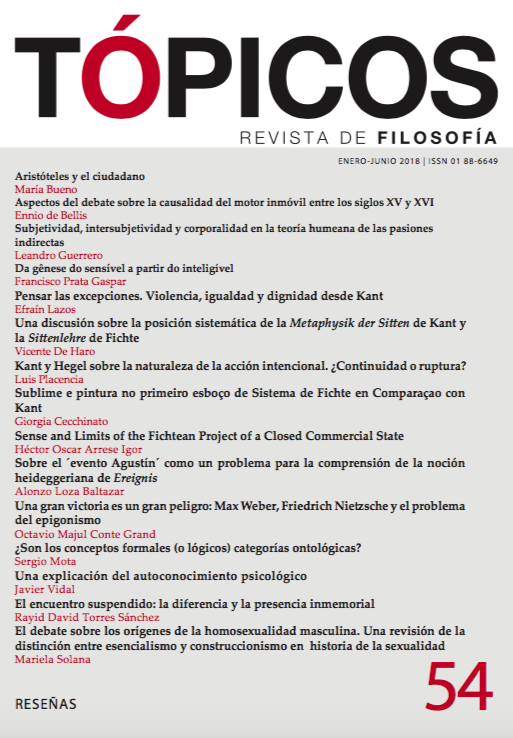Articles
Published 2017-11-11
Keywords
- doctrine of science,
- nature,
- reflexion,
- practical spontaneity,
- reflective judgement
How to Cite
Gaspar, F. P. (2017). On the Genesis of the Sensible from the Intelligible. Tópicos, Revista De Filosofía, 54, 85-115. https://doi.org/10.21555/top.v0i54.865
Abstract
It is well known Schelling’s critique of Fichte’s doctrine of science, to wit, that it would have annihilated every concept of a living nature, reducing it to a mere obstacle to be overcome for the realization of moral ends of reason. However, is Schelling right? This paper aims to refute Schelling’s critique, showing not only how the doctrine of science does not suffer from this deficiency, but also that instead it deducts from the structure of the reason the domains of knowledge, including, of course, the domain of nature. This deduction of the domains of knowledge, nature and spirit, will be made through the analysis of the passage-structure from Absolut to the factual knowledge, that is, the I’s reflection on himself, especially through the consideration of its Kantian elements: the practical spontaneity and its eminently reflective character, something that was not realized by Schelling and his followers.References
- Cecchinato, G. (2009). Fichte und das Problem einer Ästhetik. Würzburg: Ergon.
- Fichte, J. G. (1986). WL 1804 IIº Vortrag. Hamburg: Felix Meiner.
- _____ (1984). A doutrina-da-ciência de 1794 e outros escritos. R. Rodrigues Torres Filho. (trad.) São Paulo: Abril Cultural.
- _____ (1962). Gesamtausgabe der Bayerischen Akademie der Wissenschaften. R. Lauth. (org.) 42 vols. Stuttgart: frommann-holzboog.
- Gaspar, F. (2015). Fichte e Schelling em confronto – filosofia da reflexão ou não? Dois Pontos, 12/2, 79-97.
- Görland, I. (1973). Die Entwicklung der Frühphilosophie Schellings in der Auseinandersetzung mit Fichte. Frankfurt am Main: Klostermann.
- Guéroult, M. (1930). L’évolution et la Structure de la Doctrine de la Sciense chez Fichte. Strasbourg: Les Belles Lettres.
- Hegel, G.W.F. (2015). Differenz des Fichte’schen und Schelling’schen Systems der Philosophie. In: Hauptwerke in sechs Bänden. Hamburg: Felix Meiner.
- Hühn, L. (1992). Fichte und Schelling oder: Über die Grenze menschlichen Wissens. Stuttgart: Metzler.
- Kant, I. (1974). Kritik der reinen Vernunft. Frankfurt a. M: Suhrkamp. (1902). Kants Gesammelte Schriften: herausgegeben von der Deutschen Akademie der Wissehschaften. 29 vols. Berlin: Felix Meiner.
- Lauth, R. (1975). Die Entstehung von Schellings Identiätsphilosophie in der Auseinandersetzung mit Fichtes Wissenschaftslehre (1795-1801). Freiburg und München: Alber.
- _____ (1965). Zur Idee der Transzendentalphilosophie. München und Salzburg: Anton Pustet.
- Metz, W. (1991). Kategoriendeduktion und produktive Einbildungskraft – in der theoretischen Philosophie Kants und Fichtes. Stuttgart: FrommannHolzboog.
- Schelling, F. (1976). Historisch-kritische Ausgabe. W. Jacobs. (org.) Stuttgart: frommann-holzboog.
- _____ (1965). Schellings Werke. Schröter, M. (org.) Munique: Becksche.
- Thomas-Fogiel, I. (2000). Critique de la Représentation – Étude sur Fichte. Paris: Vrin.
- Traub, H. (2000). Schellings Einfluss auf die WL 1804. Oder: ‘Manche Bücher sind nur zu lange geratene Briefe’. In: Fichte Studien. Amsterdem-Atlanta: Rodopi.
- Zöller, G. (2006). Fichte, Schelling und die Riesenschlacht um das Sein. In: U. Baumann. (org.) Fichte in Berlin – Spekulative Ansätze einer Philosophie der Praxis. Hannover: Wehrhahn.
- _____ (2000). Fichte’s Transcendental Philosophy – the Original Duplicity of Intelligence and Will. Cambridge: Cambridge University Press.






